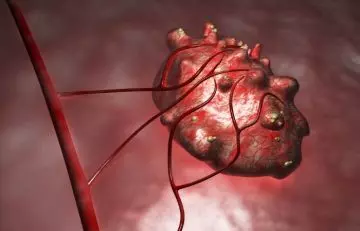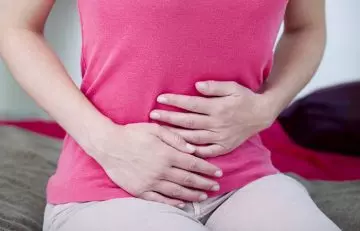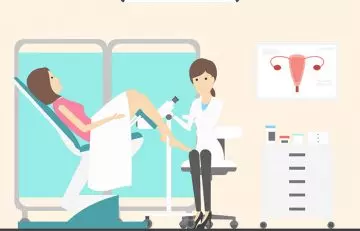Notice These Three Symptoms? You Might Be Suffering From Ovarian Cancer

Image: Shutterstock
Fascinatingly enough, on a global scale, most women shall experience an ovarian cyst at least once in their lifetime. In most cases, these don’t cause any noticeable symptoms or pain and are usually discovered when you have a standard pelvic exam. However, in some rare cases, ovarian cysts can lead to serious, life-threatening complications. Hence it’s best you get well acquainted with what is considered the red flags for this condition.
Wait A Sec… Cysts? What Are These ‘Ovarian Cysts’?
As you’re probably aware from high school biology lessons, women possess two ovaries. Located in their lower abdomen or pelvis, each ovary lies on one side of their uterus. The two ovaries are responsible for producing eggs and also sex hormones such as progesterone and estrogen.
A cyst is basically a fluid-filled sac. Depending on the cause, at times women can develop them on their ovaries. Usually, they form when you’re undergoing ovulation—when you release an egg from an ovary each month. For the most part, ovarian cysts are harmless and disappear spontaneously in a few months, without any medical intervention. In India, more than 10 million women suffer from this condition (1). If the cysts, however, don’t disappear then it could lead to complications, such as rupturing of the cyst, which could be dangerous or even fatal for a woman.
What Symptoms Can I Expect?
For the most part, ovarian cysts don’t present with any symptoms. However, if you have a particularly large cyst, or if your cyst happens to be growing, then expect to find abdominal swelling or bloating, bowel movements that cause pain, pain in your pelvis before or during periods, painful intercourse, pain in your thighs or lower back, tenderness in your breasts and/or vomiting and nausea (2).
Symptoms That Immediately Require A Doctor’s Attention
It is best advised to regularly visit your health care provider and receive routine pelvic examinations for this is the most faultless and accurate method of discovering whether your cysts have the potential of harming you.
That being said, if you notice these two red flags, it is imperative that you visit your doctor immediately:
- Severe pain in your abdomen that begins suddenly, out of the blue
- Fever, nausea, or vomiting that accompanies the fever
These symptoms would indicate the rupture of an ovarian cyst or also ovarian torsion (3). Both conditions carry grave consequences if they don’t receive proper medical attention immediately.
A rupture can lead to debilitating pain along with internal bleeding. Any vigorous activity involving the pelvis, for example, vaginal intercourse, can increase the chances of your cyst rupturing. The bigger the cyst, the higher your risk of rupture.
Ovarian torsion, on the other end of the spectrum, is when your cysts have enlarged to the extent that causes your ovary to move, thereby possibly, painfully twisting. This can lead to a drop or complete, abrupt stop of blood flow to your ovary (4).
What Is The Cause Of Ovarian Cysts Anyway?
Ovarian cysts are most commonly caused by:
1. Endometriosis
Endometriosis is a condition as a result of endometrial tissue growing outside the confines of the uterus. Women with this condition risk developing a particular type of ovarian cyst by the name of ‘endometrioma.’ It’s basically endometrial tissue that attaches to the ovary and forms a growth. Endometrioma can be particularly painful during intercourse and menstruation.
2. Severe Pelvic Infections
Infections can possibly spread throughout your fallopian tubes and ovaries thereby causing the production of cysts.
3. Hormonal Problems
These are the most common type of ovarian cysts found, also called as ‘functional cysts.’ They’re usually benign and harmless and disappear spontaneously without any treatment. They arise due to hormonal fluctuations or caused by drugs prescribed for helping a woman ovulate.
4. Pregnancy
Usually, during the early pregnancy, an ovarian cyst will form in order to help support a woman’s pregnancy, at least until the placenta develops. However, in some cases, the cyst on the ovary persists even in the later stages of the pregnancy and may require removal.
How Can I Prevent The Formation Of Ovarian Cysts?
There doesn’t exist any specific method for preventing the formation of ovarian cysts. However, if you want to be safe, it is best advised to regularly visit your doctor for routine check ups. In this way, one can diagnose any irregularity as early as possible, increasing your chances of nipping the problem in the bud. Additionally, keep an eye out for any irregularities or bizarre symptoms associated with your menstrual cycle. If you happen to discern some abnormalities that persist each month, discuss it with your health care provider.
When it comes to your health, vigilance is key. You must be attuned to your body and its changes if you want to stay one step ahead of all potential disasters. Stay vigilant, sister!




























